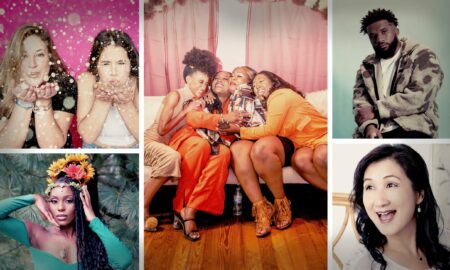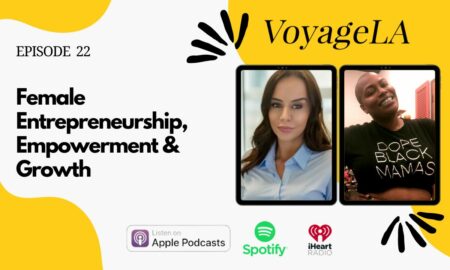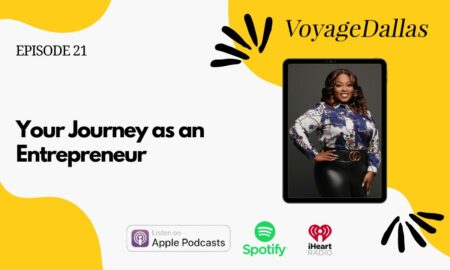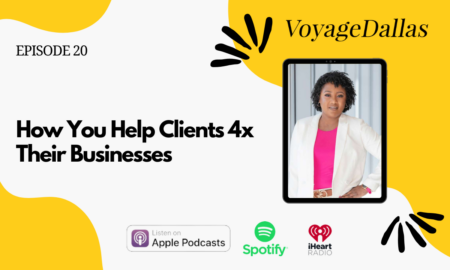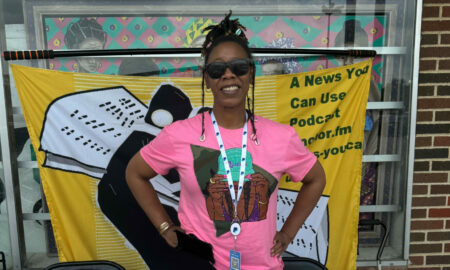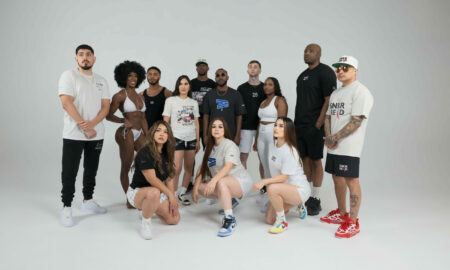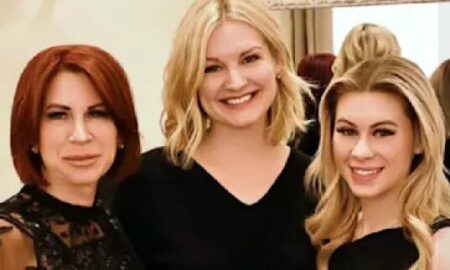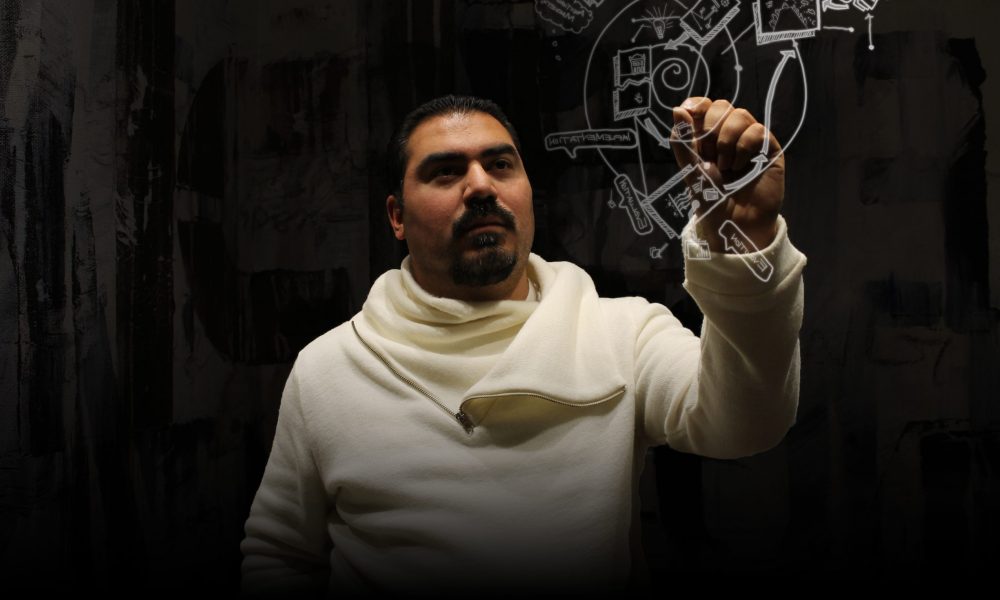

Today we’d like to introduce you to Jesse Herrera.
Jesse, can you briefly walk us through your story – how you started and how you got to where you are today.
I was raised in Fort Worth, Texas as the last child of ten (the last of five on my father’s side and the last of six on my mother’s side). My mother was raised in South Texas in a little town called Beeville during the ’50s and remembers how speaking Spanish during this time would often result in being bullied by the Non-Hispanic kids. In school, Spanish was not accepted, and the teachers would administer punishment for speaking the language.
Given these conditions, my mother taught all her children English as a first language so we could acclimate to the school system. It wasn’t a matter of denying being either Mexican or American, as we are proud of both, but she did not want us to struggle in school and life as she did. Being a working mother, time was not always a luxury, so teaching a second language became a second priority to paying the bills and keeping food on the table.
Life at home was fairly modest and trouble-free. We did not have enough money for luxuries like a vacation or eating out, but we always had the essentials. However, not knowing Spanish in addition to having a black stepfather from Philadelphia brought some unique challenges, especially as I entered middle and high school. I was picked on by my fellow Latino peers quite regularly for both of these circumstances. Seeing at this point in my life, most of my family was either in prison, far away, or untrustworthy (with notable exception to my mother, stepfather, and older sister), I found solicitude in a new family of young men going through similar issues. What started out as a brotherhood to watch each other’s backs and enjoy some good times turned into three years of gang activity. By the grace of God, sheer luck, or universal energies (pick your belief), I made it out and headed directly to college a week after leaving the life.
Without a peer group, I focused my efforts on my studies and was accepted for enrollment to the School of Architecture at the University of Texas at Arlington, being the first to graduate from my family in 2007. Professionally over 12 years I practiced architecture, construction, mechanical construction, and real estate. Intermittently I was also an educator for a couple of social innovation and architecture studios with Fort Worth ISD. My last seven years of practice were at Tarrant County College where I helped oversee the district physical assets which included 4,000,000 sf of real estate, 800+ acres of land, $70,000,000 in annually budgeted renovations, and allocated funds for Capital Improvement Projects. Taking my leap of faith, I resigned this April from Tarrant County College to pursue my vision with Urban Theory.
Overall, has it been relatively smooth? If not, what were some of the struggles along the way?
Let’s see where to start….
My real father did not have a presence in my life. A rugged war-torn Vietnam Veteran, he had a cold demeanor and I never got to know him well. He was out of the picture right after I turned 5 years old. My mother had grown tired of his frivolous ways and an affair sealed her decision to move on. I never saw him again till I was 16 and an older brother had passed away at Echo Lake. The dialogue was short with the last thing I remember him saying was I didn’t know shit about working and when I was working like him, I would be a man. We have connected since then, but the relationship is weird and awkward, to say the least. There may be a time when we can truly sit down as father and son. However, in his exit, I was graced with a wonderful stepfather who took me in as his own and who is still married to my mother.
My family fell apart following my grandfather’s death. I learned really quick the toxic effects of money as my aunt made a massive effort to purge my grandfather’s house for every stashed dollar, leaving the family high and dry to tend to the bills and taxes. This drove a deep wedge between all of us, which still lingers to this day. Cousins became distant, and my social circle was hugely diminished.
I faced mockery from my fellow Latino peers with great frustration. Not fluent in Spanish, this became an immediate issue followed by deep questioning and almost a sense of shock. “How come you don’t know Spanish?” “You are not a real Mexican!” Oh, how those words still echo with a sting of anger each time I hear them. I would often find my fellow peers switching the language intentionally to Spanish to drive the point as deep as possible. This coupled with social isolation with my family put me on a path to embrace the gang life.
As a gang banger, my struggle started the moment I walked out the door and hit the streets. Fights were frequent, and it was common for us to be in Northside looking for trouble. Drugs and theft where common tasks to keep money in the pockets or just to stimulate some adrenaline. I found myself in many situations that almost cost me my life. The last incident was a fight that resulted in a bullet hitting my friend in the neck and ricocheting off his necklace. Although things were dangerous it felt like I had a family I could trust. It wasn’t till I felt betrayed that I finally left. Leaving the gang life was a reset button of sorts, wiping my then-current social circle again and eroding my trust for people. It took me ten years to become civilized again. Even as I have aged, there are still fragments of my old life that surface from time to time.
I remember how vulnerable I was as a student. Given a choice to either work full time or pursue college from my employer I had the luxury of being able to walk away from the job because I had a stable place to call home with my parents. There is no doubt without the safety net I had with my parents, completing my degree and having the resources to pay for it would have not been possible in this situation. Considering the recession hit just two years later, I would have entered the cycle of homelessness with little direction and limited options.
The market crash in 2008 came with some interesting obstacles as well. I was put into a position where my career was no longer hire-able. With a flood of bills pouring in, it opted for an immediacy to getting a job. However, I was unable to get hired. Deemed overqualified, I was turned down by Office Depot, Staples, Fed-Ed Kinkos, Super Shuttle, and Best Buy. Quite the slap in the face after a four-year trek to get a degree. With my parents providing shelter again I was able to have enough breathing room to look for options. After removing my degree from my resume, I was able to get a couple of seasonal jobs while finishing the year with $5.00 to my name.
Lastly, as an entrepreneur, there have been challenges. Human-Centered Design is not a well-understood process in DFW and I think we are in the early infancy of establishing this market. We have conducted a lot of one on one meetings to help educate on our framework and the value it adds. Yet, there is still a lot of work to do and though I love Fort Worth, we can be a bit slow at understanding and adopting new approaches. There can also be challenges due to the conservative nature of Fort Worth’s politics and their approaches to social challenges. Fort Worth has a well-established good ol’ boy system, and sometimes getting the key you need to advance an idea can be very difficult without the right connection.
Fort Worth has a collaborative spirit, yet I often see the same usual suspects at the table. However, I feel things are changing. There seems to be a growing movement to seek alternative options and utilize collective impact to pursue larger projects. Our educational institutions have been embarking on some unique initiatives to engage in community-related challenges. Groups are mobilizing to demand equity for communities of color. The key will be seeing how we can collectively work better together to dive deeper and design scalable impact.
Please tell us about Urban Theory.
As a designer, I gained an early appreciation of the interdisciplinary, multi-faceted nature of design and its potential to solve complicated problems. However, reflecting on my journey I realized early that architecture was about making expensive commodities that were not accessible to a large majority of the population. Although well-intentioned, architecture had become a pure and contained process separated from the social challenges most desperately needing intervention. I also realized that architects are exceptional cohort builders, and really have a talent for being able to look at the big picture and the most minor of details simultaneously. The question became how we could use this creative capital and design to create impact, rather than just products. This curiosity kicks off a series of global trips to understand the nuances of cities and the amazing things being done well and not so well.
After four years of intense research, Urban Theory was formed with the belief that cities should advance innovation and well-being for everyone, everywhere. As an innovation studio, we use design to help mission-based organizations explore, discover, and deploy community-led solutions. Our organization builds on the benefits of cross-sectoral partnerships and human-centered design in addressing complex and multifaceted social and economic challenges.
We help organizations and stakeholders innovate within constraints by providing research and human capacity to advance new ideas; a safe space for design and experimentation; and a supported process to design, incubate and evaluate social innovation projects. We invest in a local leadership capacity and use a collective impact model to enable cross-pollination of ideas, build trust, and lay the foundation for future innovations. But in the simplest of terms, we help organizations take on more ambitious initiatives and help them go from the fuzzy idea stage to deployable solutions.
Our approach is unique in that is we invest deeply in connecting, recruiting, and empowering those that have been most affected to aid in the effort. Collectively, we work to eliminate the assumption from the equation and spend the time needed to thoroughly explore a topic and empathize with those we aim to help. Our goal is developing solutions that change the narrative of the topic, allow others to carry on the journey, and that put money, resources, and options into the pockets of those most affected. We are intentional in not operating any of the programs we help launch. This detachment allows us to peel back our involvement without significantly institutionalizing ourselves or competing for resources with our partners.
To date, our proudest moments have been helping to illuminate a couple of pressing challenges in Fort Worth including college homelessness and food insecurity. Through our framework, we have been able to attract a diverse crowd of participants to aid in abating both challenges. Our efforts have led to launching Grow Southeast and Pathway.
Working in partnership with The Healthy Tarrant County Collaboration, we launched Grow Southeast, an umbrella initiative for a network of six urban farms in Southeast Fort Worth aimed at addressing food and economic insecurities. This effort provides municipal routing services for a newly released urban agriculture ordinance aiding those that do not have the time to take off work to effectively route their farms for permitting. While we have learned the nuances of this ordinance, we have been developing a playbook to help others effectively navigate the process. Working in close partnership with the City of Fort Worth to streamline some of the processes, our aim is that this ordinance will be able to be completed by others without our intervention.
As we have identified specific needs, we also have provided business development resources, stipends to establish each farm, and volunteer recruitment. Opals Farm which currently operates right outside of Downtown Fort Worth was our first farm to launch and has harvested over 3,000 lbs. of food to date. Collectively we have helped foster over 13 acres of potentially producible land.
The challenge on college homelessness originally started as a forum on hostile design to discuss how we intentionally design certain populations from public space. We conducted an audit and found examples of hostile design in Downtown Fort Worth and some of the community colleges. At the forum, one of the participants shared that they were seeing an increased percentage of college students experiencing homelessness at their campus. This realization led to the development of Pathway and from there we have held a series of curated conversations on the topic to illuminate the challenge of college homelessness and change the perceived assumptions. Following a few discussions with the local AIA Chapter, we effectively worked to help develop a design competition for a Cottage Community in Fort Worth. Following, Housing Reimagined surfaced as our first strategic approach to the challenge after receiving data from Tarrant County College highlighting that 52% percent of the college population was housing insecure in 2018. Our goal is to look at housing more intimately and take a human-centered approach to design effective solutions that lay a solid foundation for future organizations to contribute to addressing the affordable housing crises and provide options that work with future learners.
If you had to go back in time and start over, would you have done anything differently?
It is hard to say what I would have done differently. I feel each experience is a core piece of who I am and how I perceive things. The only added value I could see is investing in travel a little earlier in my life. Traveling really opened my eyes to a whole new perspective and it may have helped me gain a few years on my trajectory.
It would be easy to say that I would change my career path so I could have had a job that would have paid well during the recession and put me on a path of substantial economic security, but I honestly feel Corporate America just would not have been a good fit for me.
Really, the only thing I can admittedly say I would want to change is undoing some of the pain and disrespect I inflected during my younger years as I learned to become re-civilized. I really do not like hurting people, and the transition I made from each of my chapters came with a lot of speed bumps and a few damaged relationships that I may not be able to fix.
Contact Info:
- Website: www.utheory.net
- Phone: 8172399561
- Email: jesse.herrera@utheory.net













 Image Credit:
Image Credit:
Jesse Herrera
Suggest a story: VoyageDallas is built on recommendations from the community; it’s how we uncover hidden gems, so if you or someone you know deserves recognition please let us know here.










